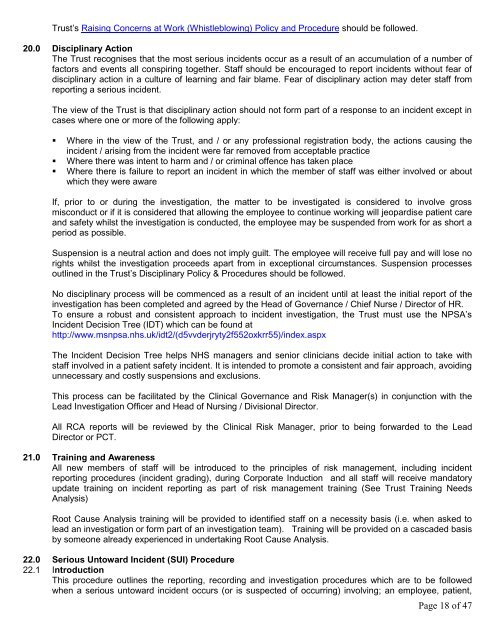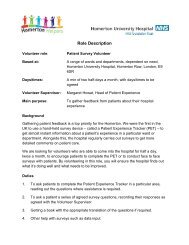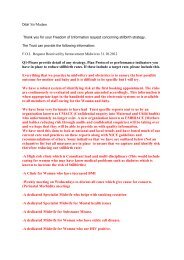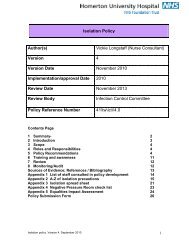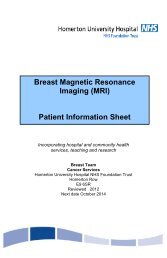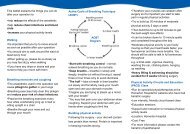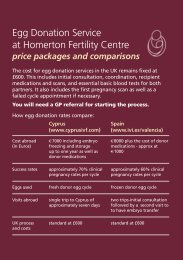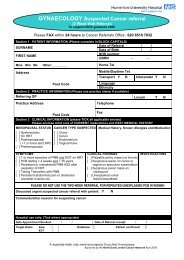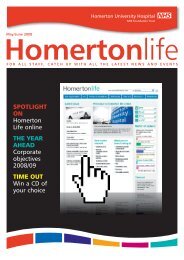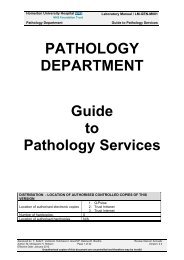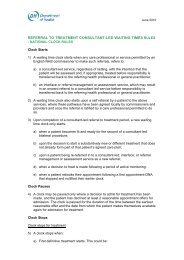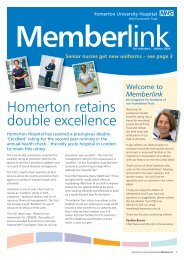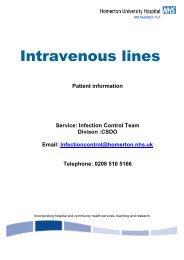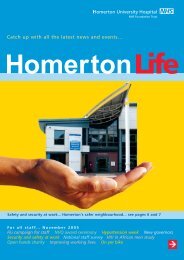Incident reporting policy - Homerton University Hospital
Incident reporting policy - Homerton University Hospital
Incident reporting policy - Homerton University Hospital
Create successful ePaper yourself
Turn your PDF publications into a flip-book with our unique Google optimized e-Paper software.
Trust‟s Raising Concerns at Work (Whistleblowing) Policy and Procedure should be followed.20.0 Disciplinary ActionThe Trust recognises that the most serious incidents occur as a result of an accumulation of a number offactors and events all conspiring together. Staff should be encouraged to report incidents without fear ofdisciplinary action in a culture of learning and fair blame. Fear of disciplinary action may deter staff from<strong>reporting</strong> a serious incident.The view of the Trust is that disciplinary action should not form part of a response to an incident except incases where one or more of the following apply:• Where in the view of the Trust, and / or any professional registration body, the actions causing theincident / arising from the incident were far removed from acceptable practice• Where there was intent to harm and / or criminal offence has taken place• Where there is failure to report an incident in which the member of staff was either involved or aboutwhich they were awareIf, prior to or during the investigation, the matter to be investigated is considered to involve grossmisconduct or if it is considered that allowing the employee to continue working will jeopardise patient careand safety whilst the investigation is conducted, the employee may be suspended from work for as short aperiod as possible.Suspension is a neutral action and does not imply guilt. The employee will receive full pay and will lose norights whilst the investigation proceeds apart from in exceptional circumstances. Suspension processesoutlined in the Trust‟s Disciplinary Policy & Procedures should be followed.No disciplinary process will be commenced as a result of an incident until at least the initial report of theinvestigation has been completed and agreed by the Head of Governance / Chief Nurse / Director of HR.To ensure a robust and consistent approach to incident investigation, the Trust must use the NPSA‟s<strong>Incident</strong> Decision Tree (IDT) which can be found athttp://www.msnpsa.nhs.uk/idt2/(d5vvderjryty2f552oxkrr55)/index.aspxThe <strong>Incident</strong> Decision Tree helps NHS managers and senior clinicians decide initial action to take withstaff involved in a patient safety incident. It is intended to promote a consistent and fair approach, avoidingunnecessary and costly suspensions and exclusions.This process can be facilitated by the Clinical Governance and Risk Manager(s) in conjunction with theLead Investigation Officer and Head of Nursing / Divisional Director.All RCA reports will be reviewed by the Clinical Risk Manager, prior to being forwarded to the LeadDirector or PCT.21.0 Training and AwarenessAll new members of staff will be introduced to the principles of risk management, including incident<strong>reporting</strong> procedures (incident grading), during Corporate Induction and all staff will receive mandatoryupdate training on incident <strong>reporting</strong> as part of risk management training (See Trust Training NeedsAnalysis)Root Cause Analysis training will be provided to identified staff on a necessity basis (i.e. when asked tolead an investigation or form part of an investigation team). Training will be provided on a cascaded basisby someone already experienced in undertaking Root Cause Analysis.22.0 Serious Untoward <strong>Incident</strong> (SUI) Procedure22.1 IntroductionThis procedure outlines the <strong>reporting</strong>, recording and investigation procedures which are to be followedwhen a serious untoward incident occurs (or is suspected of occurring) involving; an employee, patient,Page 18 of 47


